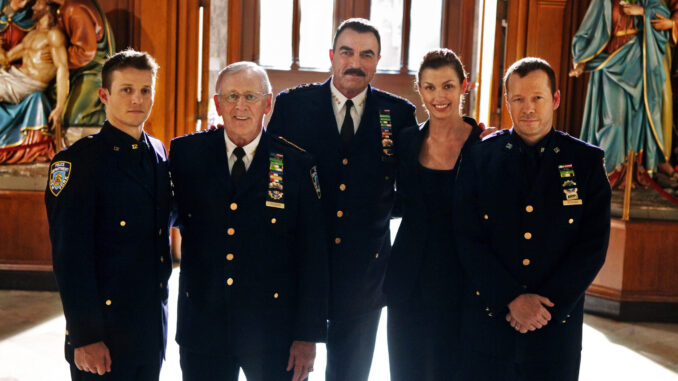
In twenty years of writing this column, I don’t believe I have ever written about a television series. Largely because I don’t watch a great deal of television. And when I do watch, it is usually long after whatever I am watching has ceased to be newsworthy.
In 2010, when this column was only six years old, CBS premiered its new police drama, Blue Bloods. Fourteen years later, its finale is this Friday. I have been watching for most of that time.
It has been an extraordinary run in a time when network television has been hemorrhaging audiences. The star is Tom Selleck, whose 293 episodes of Blue Bloods are added to the 158 episodes of Magnum P.I. he starred in over eight seasons in the 1980s. At nearly 450 weekly episodes, Selleck is likely one of the most successful primetime stars ever.
Blue Bloods is not only a police drama. It’s a family drama about a police family. Selleck plays Francis Xavier Reagan, an Irish Catholic police commissioner of New York City, serving in a post first held by Theodore Roosevelt, whose portrait hangs in Reagan’s office. Widowed, he lives with his widower father, Henry Reagan, the retired NYPD commissioner. He has three sons and a daughter. The three boys are on the job in NYPD, though the eldest was killed by corrupt cops before the series begins. His daughter is an assistant district attorney in Manhattan. Law enforcement is the family business.
Henry Reagan — “Pop,” the patriarch the Reagan clan — is played by Len Cariou, officer of the Order of Canada and member of the Order of Manitoba, a Winnipeg native whose theatre work included stints in Stratford.
Blue Bloods has been so successful because it is not crime-driven, but character-driven. While police shows are interesting in that there is a puzzle to solve, the crimes themselves become monotonous. C.S. Lewis taught us that all sin is repetitive; it is virtue that is truly original. Blue Bloods is about a family trying to be virtuous in a profession that works daily amid the wages of sin.
In a speech to the policy academy graduates, Frank Reagan tells them that their real foes might use new technology, but are ancient in form: pride, greed, envy, lust, and wrath. He is a worldly cop with a supernatural vision.
The deadly sins are not only a professional concern for the Reagans; they too struggle with them. That’s part of the attraction. The Reagans are a Catholic family. They go to Mass on Sunday and have family dinner afterwards; the family dinner scenes — complete with them praying grace before meals — are the most distinctive and popular feature of the show. While they are the only primetime family that prays regularly on screen, they are not idealized. They struggle to do the right thing, even sometimes wrestling with what the right thing is.
“The great scene is not going to be about the car chase,” executive producer Kevin Wade told me in a 2020 telephone interview. “The great scene is going to be about what happened in that car chase that affected the moral life or the inner life of our character.”
Characters with power must decide how to wield it, and the police have power. Blue Bloods has been a pro-police show at time when policing itself has become controversial.
“There is a dark side of the police because the police do a very dark job,” said Wade, immersed as they are in the evil men do. “We can’t tell good stories about good cops; we can tell good stories about good cops and bad cops and what makes one good and one the other.”
As one who has written for years about the abuse of police and prosecutorial power, I never found Blue Bloods defensive, even when it defended the police. The show had the wisdom to know that institutions, like the NYPD and the Catholic Church — which figure prominently in the writing — are at their best when they confront the weakness and wickedness within.
I suggested to Wade that what set Blue Bloods apart was that it was show about virtuous men. Grandfather, father and son are all widowers. It is about men being fathers and sons, and fatherhood is the oldest story that there is.
Wade differed, thinking of Blue Bloods as being more about tribes. There is the police tribe, and also the military tribe (Pop served in Korea, Frank in Vietnam, Danny in Iraq), the Irish Catholic tribe, and the New York tribe. Unlike most Hollywood shows, which are written, shot, and edited in California, no matter where they are set, Blue Bloods is written, shot, cast and edited in New York by New Yorkers. New York itself is a character in the show.
Tribes are the stage upon which fathers play their roles, handing down what is noble and what is not, trying over generations to sort out blood and belonging, and what priority to give them over against faith, honour, and duty.
For fourteen years on Friday nights, all that was sorted out around the Reagan dinner table. In a time marked by crises of faith, family, fatherhood, and fraternity, Blue Bloods told stories worthy of our attention, which it held for so long.
